#you can't even give the excuse of 'but it's a shonen; action matters the most!' NO
Explore tagged Tumblr posts
Text
my friend once said j/j/k was the most overhyped mid manga/anime she's seen and she's so right tbh
#don't get me wrong it's an entertaining battle shonen#but i think the series benefited MASSIVELY from the anime's high production value#and a genuinely solid first half#(although as the series gets longer it's rapidly becoming only the first third lmao)#but calling it the best or even among the best.... no imo#you can't even give the excuse of 'but it's a shonen; action matters the most!' NO#there are great shonens that balance action and character development and story/themes and i won't pretend they don't exist lol#sorry i'm on my hater train rn#yes i will continue to be back every week to read the new chapter
4 notes
·
View notes
Text
It's okay, don't worry, it happens!
I think we should agree that, even we both live in western countries which are more similar among them than if we compare them to Asian ones, they're still different countries with different cultures, different educational methods, laws, religions, and that this form our experience and worldview. Just to give you an idea, the boys you mentioned are all guilty of school massacres. In my country we don't have such a thing. The closest to a shooting at school we had was done with a toy gun used against a teacher as an idiotic prank/form of harrassment. No one died and, obviously, no one expected the parents to cut contact with their child for that.
We do have criminals, of course, but none of that kind.
At this point I could give you info on our young criminals, what they do and how their parents, of how, not long ago, a girl (who wasn't victim of family abuse) with her boyfriend murdered her mother, her little brother and wanted to murder her father too but due to circumstances didn't manage and yet the father forgave her and remained near her because she's his daughter while the mother forgave her before dying and no one found the parents' reaction odd but I think the starting point would stay. Our experiences, culture, way to live, are different, we live things differently and so we react differently.
For example I see Touya's case as very different from the one of a singular mass murderer as he's the member of the equivalent of a domestic anarchic terrorist/revolutionary guerrilla group (which takes control of a huge domestic Quirk supremacist terrorist/revolutionary guerrilla group), which makes matters complicate because in my country we've complicate feelings toward domestic terrorist/revolutionary guerrilla groups (extremely long and complicate story). In fact while serial killers NEVER get sympathy and are labelled as monsters, domestic terrorist/revolutionary guerrilla groups might receive sympathy for their ideals or because they were actually fighting against an invader who occupied their country, which of course influences my judgement.
[Interesting enough the domestic terrorist guerrilla group behind the Tokyo subway sarin attack should have been the inspiration for the third BNHA movie]
Anyway, back to the original point, we're probably not going to find an agreement on what people 'normally' do, exactly because due to different cultures we've different versions of 'normal'... which are likely more similar among them than the Japanese one but still different.
And yes, most of what I'm saying is not from a Watsonian perspective.
From a Watsonian perspective the characters are people, and they can do whatever and we can chose whatever reason we prefer to excuse their actions if Horikoshi didn't canonically give us one.
I tackle the story from a Doylistic perspective.
The author has to drive home his message in a convincing manner.
Shonen in general, and MHA in specific are about never giving up, are on keeping on doing your best even against impossible odds.
So on a general line, if in a shonen a character gives up on something, he has picked the wrong choice and it will come to bit him back, not because in real life you can't give up but because the message of the story is YOU MUST NOT give up.
Enji's arc is one of atonement, in which he has to prove which kind of father he can be. If he prioritizes his Hero job the story will hit him on his head with it being a wrong choice.
In fact, the fact he chose to face All for One was the 'wrong' choice.
Not only Shouto couldn't stop Touya and ended up on making him angrier and more desperate but, accidentally, taught him phosphor, which becomes the reason Touya managed to handle raising hs temperature to such a high level. Shouto used phosphor to reach an impossibly cold temperature with his Quirk without freezing himself and Touya used it to do the opposite, which was exactly what Enji wanted his masterpiece to be able to do, used it to keep himself cold as he used an impossibly high temperature.
(just to make sure... I'm not criticizing Shouto here and I'm oversymplyfing the story because we're talking about Enji, not Touya and Shouto)
The result is that the situation is worsened.
The characters though, couldn't know that was the wrong choice, it actually seemed the best choice, Aizawa could have praised it for how rational it was... but as readers we could see it was bound to backfire.
But what if they had took the other option, how would it have worked, was it possible for it to work?
The story would have created the circumstances to make it work. Midoriya reached out to Tenko and lost his arms but the story gave him the means to have them back.
And we've plenty of other situations like that. When the characters do actions that drive home the positive messages of the story, the story, in order to pass it on, give them the chance to win.
It's a story on a shonen manga, it's not real life, it's meant to drive a message home not to teach us battle strategies to face Villains.
The reason why, for me, Enji's atonement works is because Enji didn't give up on atoning, on saving Touya and didn't chose his Hero job over Touya.
Dying with him had a meaning in his culture, one that it doesn't have in mine. Dying with him is meant to save Touya's soul in his culture, where in mine it doesn't save anything.
So I make a divide.
If Enji were to be a man from my country, or better if he were to be written as a character from my country using the people of my country as target audience... as a character he would have done a poor job at fulfilling his arc, his role.
Choosing to die with his son to save people here would mean nothing in regard to his atonement arc to Touya. He's just doing his job, prioritizing it over his son AGAIN.
He had no other option? As I said before, this is a story, that's not a valid excuse for not to keep fighting.
But in a story aimed at a Japanese audience?
He's doing good. After all, three volumes before that moment, we read one of his main traits is he's persistant, that he doesn't give up.
And Horikoshi was good at depicting this, I've already pointed it out in another post in reply to another person.
Enji first chose to die with Touya in atonement, and AFTER that they won't involve anyone else in their tragedy.
The point of Rei, Fuyumi and Natsuo is that they're doing the same. They know they don't have an ice Quirk powerful enough to stop Touya.
They're not trained Heroes and Shouto, who's amazing at using his ice Quirk, the first time couldn't stop him either.
But they still try. It's suicide, it's impossible... but they're still trying. And they do also try to talk to Touya. And the story will reward them. Not only Touya realizes they're there and hear them and we've this image...

...while they can't stop the explosion, for a brief moment they managed to lower Touya's temperature. This meant they basically bought Shouto some more time, the time he ultimately needed to arrive and save the day.
In the same way as Mirko and Mirio kept on fighting Shigaraki waiting for Midoriya to arrive, buying time for him to arrive even if it was impossible for them to beat him, the Todoroki managed to stall things long enough.
Because they didn't give up. Because they gave their best. Because their fulfilled their role in a story whose message is also about never giving up and keeping on hoping.
Said all this... the Todoroki arc, the Himiko/Toga arc and the Shigaraki/Midoriya arc all had the same 'problem'.
Horikoshi decided that the Villains won't be saved (yes, Touya survived the battle but we're told he's going to die so he only postponed his death).
So sometimes they don't do things other characters will do in other stories and that would stereotypically work because... they're meant to fail. Yes, the Todoroki could have talked more to Touya, could have tried to persuade him to stop... but it was bound to fail because Horikoshi set them up to fail so it won't dawn of them to do X, no matter how logical it would be because... they're meant to fail and doing X and showing it wouldn't work would be bad because it would be a waste of story time and would risk going against the theme.
Himiko and Shigaraki were meant to de and who knows, it's possible even Touya originally was meant to die after Enji said sorry but then Horikoshi decided to keep him alive a little longer (after all in Horikoshi's old plans Enji was meant to die earlier as well).
Anyway Touya is meant to die, not for realistic purposes because the story saved people who should have realistically died and not even for story purposes (Gran Torino survives even if his survival or his death after he gave his parting words to Midoriya makes no difference in the story, same goes for Compress, whose only role after the PLW is to listen to Geten and to read Spinner's book, all things that don't really change th plot much even if I loved him reading Spinner's book) but because that's the plan Horikoshi had.
Touya's brain being conveniently fried (same as Spinner, same as Shigaraki whose brain doesn't get fried but get possessed so that you can't really talk with them much) in a way that's pure fiction it's just a plot decide Horikoshi used that honestly I'm not fond of.
You make a strong divide between Touya and Dabi... but the divide is actually a lot more thinner. Touya isn't Kurogiri as far as we know. He never died, he survived the fire, he only ended in coma, for three years. Of course after 10 years away from home and a pile of trauma and negative experiences he's a changed person. But he's still a living person and he's still Touya, Enji's son.
He was meant to be a spare for All for One should Shigaraki fail for Garaki's own admission. They could have turned him into a Nomu eventually, probably tey would have turned him into a Nomu since Shigaraki was a success, but they never managed to because Touya escaped.
He's not Kurogiri who died and came back as a reanimated corpse.
Dabi being symbolic of a corpse, of the Frankenstain monster, of a vengeful ghost is just this, symbolic.
The fandom is currently split on the whole debate if 'saving the soul' without saving the body is still saving. It's undoubtedly a popular trope... but it's also a trope many hates and find unsatisfactory. I've not said all. If you're among the ones who love it, then it's okay.
In Buddhism which has strong ties with this story, saving the soul is what truly matter, the body is just a container.
However... Heroes would be soon out of job if all they did was 'save the souls'. A Hero is a Hero because he saves lives, not souls.
Midoriya doesn't cound as a win the fact he couldn't save Shigaraki's life nor does Uraraka count as a win the fact she couldn't save Himiko's even if both saved their souls (which, as I said in another post, is VERY important in Japan) and they had a lot less interest in saving what were basically two strangers to them.
Shouto went to face his brother thinking he could stop him without killing him, Enji made clear he didn't want to do as much as fight him and, while he faces Touya, he doesn't fight him.
They didn't go there to let him die and just save his soul, they wanted him to live, Enji said it out loud rather clearly.
Narratively it wasn't a complete win.
The general implication seems to be they were all too late, that's why they couldn't also save their lives.
Uraraka voiced it, someone should have done something SOONER.
That's why the chapters of the epilogue become important, because people start acting instead than waiting for a Hero, so that JokiJoki (that's how the boy the grandmother saved is called in the "World best Hero" pool) was saved and didn't become Shigaraki. Because someone acted sooner.
In the same way that's why Uraraka's Quirk counseling program is important, because it's meant to help stopping people from becoming Himiko.
What about Touya? The story already told us sooner how Shouto believed he could have become like his brother but Midoriya saved him before this could happen.
The lesson Horikoshi decided to drive home here is on the importance not to waste time or there will be negative consequences.
And this ties to your last point.
Yes, it helps no one that Enji is disabled, it doesn't happen because it's supposed to help someone.
In a Japanese contest the idea is that if you do something, that something will have unavoidable consequences. You can't escape them no matter how sorry you are. It's hitsuzen (必然).
To oversimplify:
if you drop a glass of water it will fall. If you don't collect all the pieces of glass and then will step on them with naked feet your feet will end up cut.
It can't be helped, it's how the world work.
You can see it as 'punishment' as if you held the glass better it wouldn't have shattered and if you'd done a better job at picking up shards they wouldn't have cut you, but there's no one punishing you for your carelessness and sloppiness, at most you're punishing yourself.
In the west with variations on the theme as we don't all profess the same religion, many believe there's a god that protect us and that, if we misbehave, he will also punish us... but that if we show sorrow for our misdeed we can be forgiven and god will go back on protecting us.
Again, it kind of varies according to which brand of religion is more popular in your country and how but that's the general idea and it's an idea with historical roots in Europe, people during the inquisition were told if they were innocent they wouldn't feel the pain of torture and, as absurd as this is, it went on for centuries and left a long lasting historical memory in the way we're educated to see things that's so pervasive even when people don't believe in a god that punishes misdeed, they might still have incorporated in their language and feelings the idea that some things are 'punishment'.
To oversimplify, going back to our example it'll be like saying if we are appropriately sorry and remorseful for dropping the glass god will protect us from cutting or will help us finding all the shards.
Remember, I'm oversymplifying.
Back to Enji, all he did lead to Touya's madness and to the fact Touya tried to nuke Japan and he couldn't persuade him to stop but still decided to die with him and this lead him to end up disabled. It's consequence and it's unavoidable.
It doesn't matter if it doesn't help no one, it doesn't matter if Enji is sorry now and it doesn't matter if he's not the only cause of the situation he was in.
He did what he did so he had to face consequences.
It's basically the same principle behind Shigaraki's speech.


Negative actions caused negative unavoidable consequences.
So what's the message? Won't it pass the idea it's useless to try to atone?
No, because if you don't, negative consequences will get even worse and the backlash will be even huge.
That's why the circle of pain has to be stopped, because if not it only worsen things.
In a way it's salvation Enji decided to atone because otherwise things would have gone worse.
Of course the problem here is that this isn't real life but a manga and in a story it's author is its god. There are no consequences if the authors doesn't want them to happen or forget them to happen.
Horikoshi tries to reproduce his beliefs in the story, that what Enji did in the past will necessarily have serious negative consequences, but that the fact he stopped doing wrong will stop those consequences from escalating further, but ultimately he's a human who makes things happen in his story and writes it for readers who wanted to see consequences happen.
He decides on the consequences according to how much he thinks they're fair and they would satisfy the readers. Basically you can view this as him punishing Enji.
He tries his best into making the consequences as a reaction to the misdeeds but, of course, it's a story, he's cherry picking them and using them as a message.
It's absolutely symbolic how Enji ends up on completely losing his strenght by becoming a disabled person who depends on others, it's absolutely symbolic how he ends up getting burned by his son's fire (and I'm willing to bet Touya's Quirk originally was also called Hellflame... it couldn't have been called blueflame as Touya's flames weren't blue yet when his Quirk was registered on the Quirk registry). It can however also work as a direct consequence of his actions.
Fundamentally he drove his son, who had an extremely powerful fire Quirk to madness, and this is the result of facing him too late.
Horikoshi isn't causing this with the aim to invalidate Enji's atonement arc and regret. Because Enji regrets and atone he still have people around him to support him.
If he hadn't likely the consequence would have been he would have ended up alone. His previous actions and his present actions are handled separately and don't nullify each other but lead to different consequences.
Again, it's a story, so, of course, this is no impartial math but Horikoshi's will.
And Touya faces consequences too. Now that his family is finally looking at him, he has to die. Now that his family is finally willing to spend time with him, he can't stay with them for too long. It's consequences again.
It's just they're not meant to fit in our idea of crime/punishment, but more in a cause/effect relation.
Touya destroyed his body knowing this would lead him to die so, of course, this is what is meant to happen.
Of course the fact that IT'S A STORY where sometimes consequences are magically waved away by some deus ex machina Quirk/scientific thing makes thing troublesome.
Horikoshi has written himself in a corner more than once due to this (in comparison "Dragon Ball" was much better at setting this sort of rules).
Ultimately, since that's the end of the story, Horikoshi preferred to lay out the message that Enji faced both the negative consequences of his negative actions and the positive consequences of his positive actions instead than have the positive consequences nullify the negative ones (for example having Shouto ask Eri to rewind him since her horn regrow).
If BNHA were instead to have more arcs ahead of itself whcih required Enji to still fight they would have probably done something to restore his body. As it is they left him as the embodiement of the consequences of negative and positive actions.
Again, different culture, different views and ideas to pass messages.
Sorry if I replied that late but now that I'm back at home life is kind of busy...
Did Enji atone to Touya (and his family) and stepped up on his role as a father?
Boku no Hero Academia has a grave 'flaw'. The fact that's strongly tied to Japanese culture and Buddhism makes it a very interesting work but also makes it a hardly international work because way too many cultural things are left unexplained because they're assumed to be a given. Only they're not when the work is read by foreign readers. And this lead to confusion.
The Todoroki plotline is an example of this.
In the west many feel Enji did nothing for Touya or did too little because the little he did is a given in the west. The point is... it's not a given in Japan. In Japan is a BIG DEAL. So let's go though it.
First, the fact that he doesn't want to kill Touya even though he's a criminal

Todoroki Enji ‘Ore wa ikinobite mo... ENDEAVOR wa shinda. Tairyō satsujinsha (read: musuko) to tatakaenai.’ 轟炎司「俺は生き延びても...エンデヴァーは死んだ。大量殺人者(むすこ)と戦えない。」 Todoroki Enji “Even if I survived... Endeavor is dead. I can't fight against a mass murderer (read: my son).”
Let's compare it to these two scenes of "Death Note" and see how Yagami Soichiro, a policeman, is taking the idea his son might be a killer and how, although Misa protests, the story doesn't present it as him being crazy but as it being his duty.
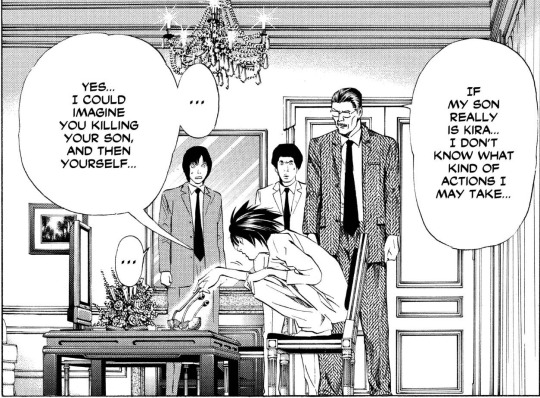
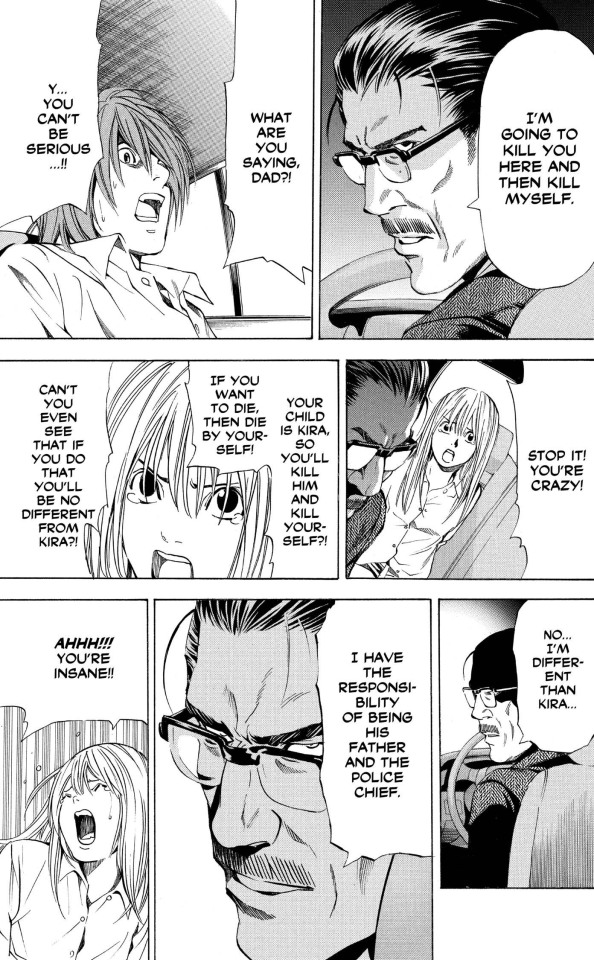
That's why Hawks doesn't want to send Enji, who's on an atonement path, to face Dabi, because Enji might end up in a situation in which he would have to kill his son and he would refuse... which is more or less what happens.
Second, Enji acknowledges that what Touya said is true, Touya is his son and Enji did what he did. In such a situation many would lie. Dabi's video proves nothing. He is a Villain, they had a doctor in the team who could create Nomu, the paternity test could be fake, even if Dabi were to provide a sample of his blood or skin they could insist that's fake.

Society didn't want the truth, they don't want Enji to confess, they wanted him to reassure them, they even commented he should have lied because yes, that's what's done often.


Basically he put his honor on the chopping block. A public apology like this one is a BIG DEAL in Japan. It's much more serious than in western countries and he does it when he could have spared himself and say Dabi lied but that would have meant to deny his son.
Third, it connects to the first in a way. While Enji is unwilling to kill Touya, he's willing to die with him. It's ‘shinjū’ (心中 Lit. “Mind/heart center/inside” but more likely means “oneness of hearts”, probably reflecting a psychological link between the participants) and it’s a word used in common parlance to refer to any group suicide of two or more individuals bound by love, typically lovers, parents and children, and even whole families. People who commit shinjū believe that they would be united again in heaven, a view supported by feudal teaching in Edo period Japan, which taught that the bond between loved ones would continue into the next world, and by the teaching of Pure Land Buddhism wherein it is believed that through shinjū, one can approach rebirth in the Pure Land. By volunteering to die with him, Enji is basically agreeing to remain with him in their next reincarnation.
For us it's crazy, it's Enji giving up on saving him. In Japan it sounds like 'I love you and I want to be with you'.
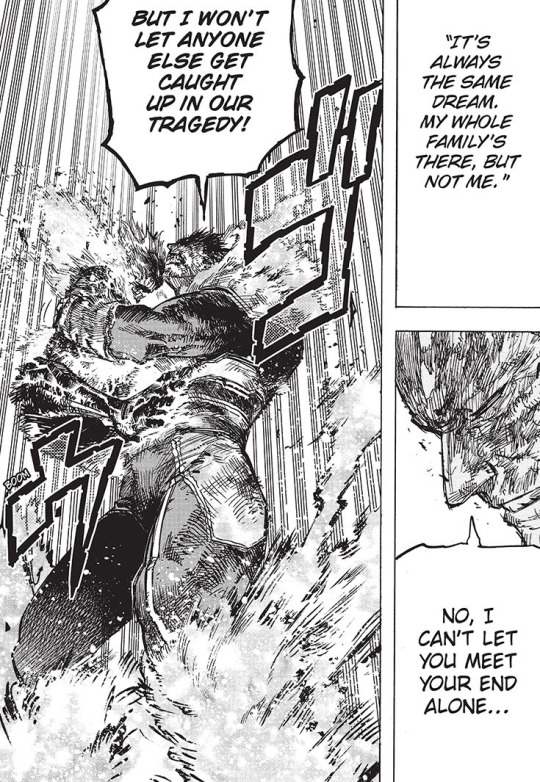
Forth, he'll apologize to Touya. As said before it's a BIG DEAL, especially since Enji is the family head and, although for us most of what he did is wrong, in Japan most of what he did is well within what he can do. Marrying a woman you don't love in a combined marriage to expect the child who'll be born from it will fulfill your ambitions and not really bothering to raise it because that's a mother job, well, things are changing in Japan but none of the above is a crime. In a not so distant past it was actually the norm. Yet Enji apologizes even though normally a family head wouldn't.
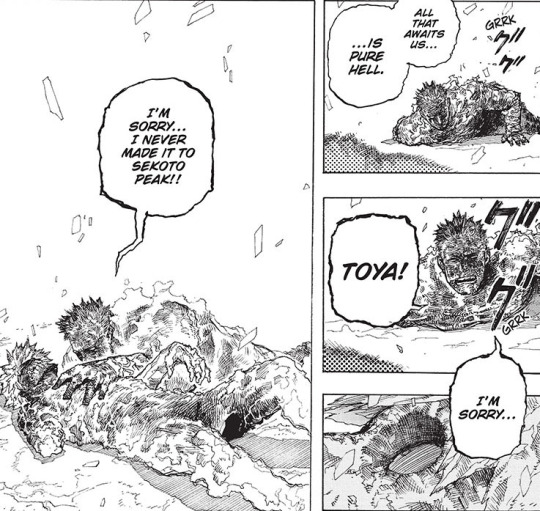
Fifth it's a bit in the first point and in the second but it'll drag on through all the story, Enji won't reject Touya. He's the only one (except Fuyumi who however doesn't get to say much) who never calls him Dabi after the reveal, and he won't strike him out of the family register but will keep on considering him his son.
Look at the Tobitas instead and at how they kick their son out.

Don't think Hawks is cutting strings with his parents solely because they were abusive, the Tobitas show us how you should just cut strings with a criminal. Same as the Togas.
Have "Theseus no fune" in which a man accused to be a murderer, send a birthday gift to his son and watch the reaction of his wife.
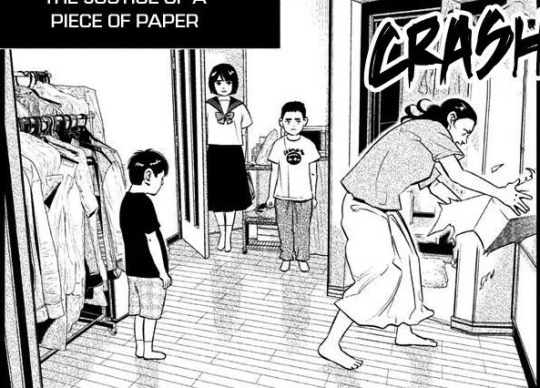
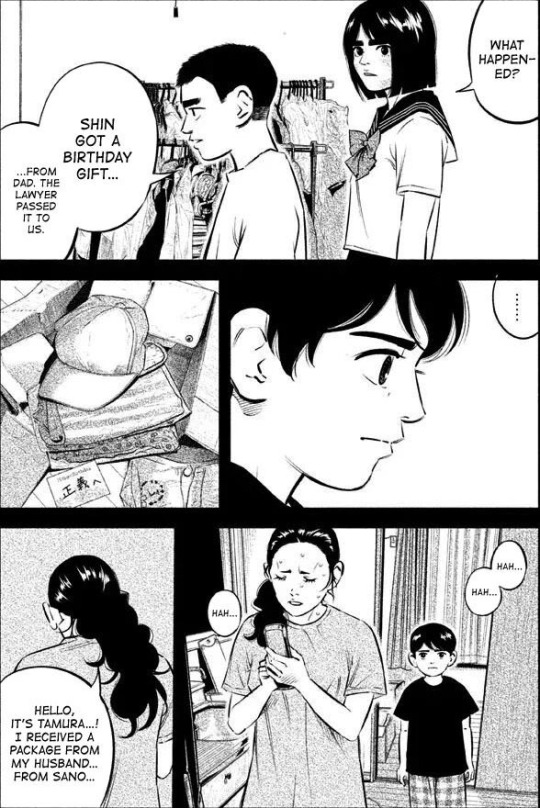
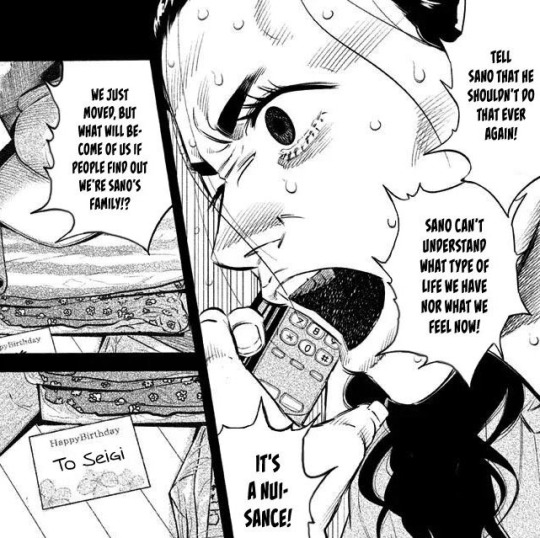
They don't want to keep contact with a criminal. It's scary because they'll be mistreated if they are discovered to be related to him.
And, in this vein, the fact he wants to go see him, that he'll keep on seeing him till the end instead than turning his back on him, is seen as important. It's seen as him being his father.
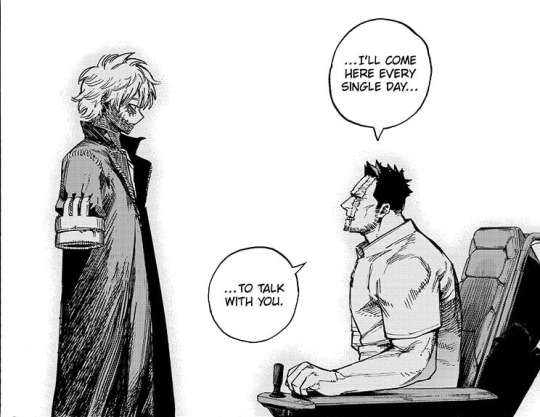
To many of us it seems as if he's forcing his presence upon Touya. Actually, from a Japanese perspective he's instead not abandoning him like many others would.
And since Touya is dying, very likely the talking will be the talking that's done in a Buddhist culture when someone is dying. Death should occur in a calm and peaceful environment, with close friends and family in attendance. Together they should reflect on the good deeds the dying person has done throughout their life, in the hopes it will help them in their next reincarnation. Additionally, family and friends can perform good deeds on behalf of them, which they believe will be of merit to the deceased.
So, since Touya is dying he won't get a scolding like Chisaki, they'll all only tell him nice and soothing things so he'll die peacefully.
Now... in the west all this is absolutely way too little, and in some points even feels wrong. Dying together instead than insisting in trying to save him? Deciding unilaterally to show up every day? Not our thing...
We can totally say 'thanks, I hate it' because we grew up with Darth Vader who instead gave his life to SAVE his son. All this accepting that Touya instead is going to die so Enji can at best die with him or keep him company until he does... well, it's mostly not our cup of cultural tea.
In in Japan though, all Enji does is important. Enji is doing something for Touya as a father, something important many fathers wouln't do for their sons.
Does it would satisfy a Japanese audience? They'll get the message better than us... but things are changing and anyway it can still feel too little. "Death Note" is dated 2005/2006 and back in it Misa was already questioning the idea of a father killing his son and then killing himself. BNHA is more innovative as Enji doesn't think to kill Touya but he still goes for the 'let's die together' route... and Horikoshi subtly criticizes it by having the rest of the family decising they'll try to stop the fire before just giving up. They're willing to die, but not before trying.
Enji represents plenty of old theories after all, which Horikoshi acknowledges were moved out of wrong beliefs, not moved by mean intents... which, is possible, would still not be enough for Japanese readers either because among teenagers, the target audience, there's an increasing number of teen who, in Japan, are forced to leave home (the Toyoko Kids) and often ends up committing crimes to survive and the league seems to be based on all the kind of homeless people Japan has.
While for a kid at home with a loving family being told that your father will die with him if he messes up instead than just dumping him might be comforting... for a kid that was abused and forced to leave home this might feel not enough.
People want to be saved, being told it's too late to save them, might be a lesson for those who hadn't done anything wrong yet so that they won't do it, but it's surely not a hopeful message for who instead got himself into troubles.
But well, that's something for the Japanese audience to ponder.
There's also to point out that, even though the message is not hopeful, Horikoshi is seeing the homeless people and acknowledging they should be helped.
Japan in regard to the Toyoko kids is mostly like the old woman who pretended not to see Tenko but that, in the end, helps that new boy.
I think Horikoshi's message desperately wants to be hopeful even for them, that he wants BNHA be like Midoriya's final stand, something that will push people to acknowledge they exist and reach out to help them.
It just that... it gets lost in what I'll call the 'litteral translation'.
No one explains us how we should jusge the scenes and, since we lack the cultural background, to us they are perceived differently because to us things work differently.
And, personally, even when I think I figured out the author's intent and can see the positivity of it, the cultural filter is still too tick and the picture gets blurried.
It's like being beginner at speaking a foreign language and having to constantly translate it in your head. The message loses its natural beauty, get simplified and not fully grasped.
I think I understand how Enji's atonement work in regard to Touya... it still doesn't feel fulfilling to me. But enough about Touya.
'Now,' you might rightfully say, 'fine, I'll bite, let's assume what Enji has is an atonement arc for Touya. It doesn't work at all in the west but let's give it a pass. What about his other kids?'



Natsuo and Fuyumi's wishes are in conflict.
Fuyumi wants the five of them to be a family (at the time she doesn't know Touya is alive), Natsuo doesn't want to be part of a family with Enji.
Enji's solution is giving Fuyumi a house in which she can welcome her mother and live with Natsuo (and Shouto when he comes home), while he removes himself from the equation. The solution fulfills Natsuo's wish of not seeing Enji because it makes him feel bad. It only partly fulfil Fuyumi's wish because it'll allow her to have her mother back (Rei couldn't bear meeting Enji either) and to stay with her siblings... but Enji takes responsibility for it, he doesn't tell her it's due to Natsuo that he can't live with them, so, in theory, it won't be Natsuo the one who's stressed to be at home when Enji is there and the one who has to leave home because he can't stand the sight of Enji.


There are many things I can say on how this is not a good solution (it doesn't make Natsuo feel better, it just stops him from feeling worse), but there are two points to consider. The first is that Enji is getting old and it would be his children's duty, due to filial pity, to take care of him, instead he's basically giving them the means to leave and take his wife with them.
Actually, since Natsuo is now the oldest MALE, it should fall on him specifically. Yes, Enji always intended to have Shouto inherit his mantle but this doesn't free Natsuo from his duties. Instead Enji is letting all his children free.
Even with Shouto, he doesn't insist anymore for Shouto to learn Flashfire Fist as his heir but just as an intern.
I take this is big in Japan.
Here again, not so much, especially in the countries in the west that think kids should leave their parents' home as soon as possible and we don't think our children are obliged to inherit our mantles.
Note how the story implies that this was meant to be the end for the Natsuo/Enji arc.
Natsuo made clear he didn't want to meet Enji again, he does it solely because they've to stop Touya and, once they've stopped Touya, he makes clear he doesn't want to see him again.
If we want though, the fact he's leaving the family can be seen as a concession in a way.
Since apparently Rei wants to stay with Enji (and likely their old house was devasted because that's what happens to relative of criminals) Enji can now move with Fuyumi and Rei and Natsuo won't have to see him because he'll leave home... to make his own home.
As for Shouto... Horikoshi answered his request by basically showing him Enji being a father for Touya and then promising he would protect them from the fiery fallout, which Horikoshi doesn't show at all because it's another thing that's a given in Japanese culture, it'll be hell for Enji to protect them, but not for us.
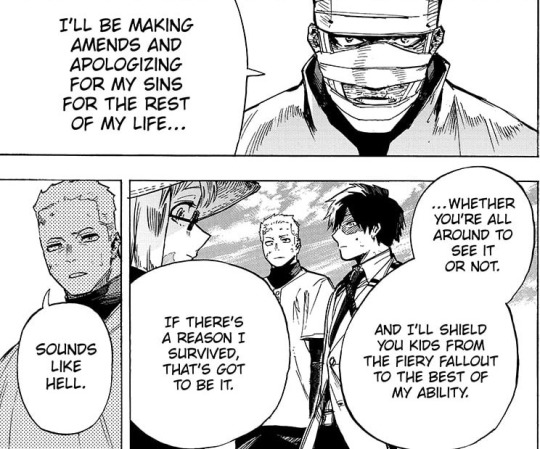
Just to get an idea of the fiery fallout here are some images from "Theseus no fune" again showing you how bad is this sort of thing.
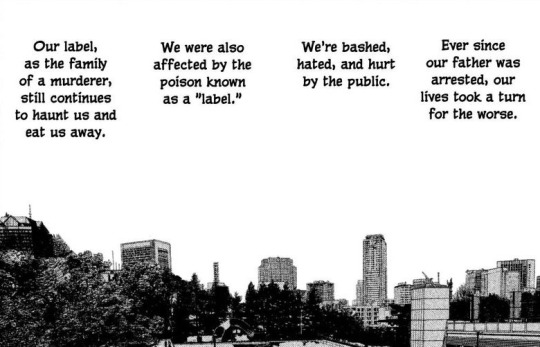
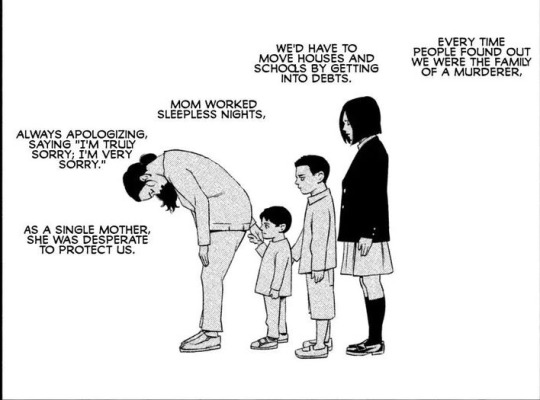
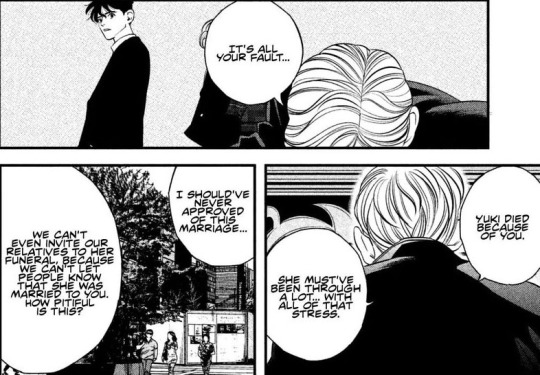
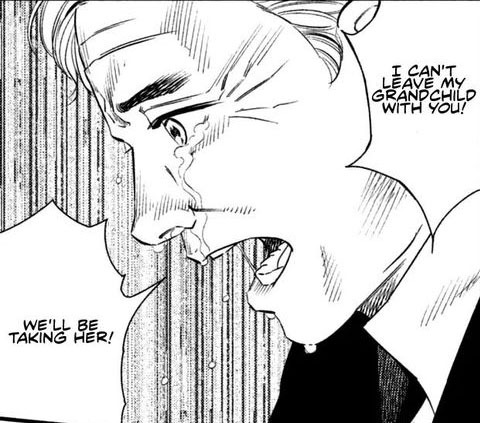
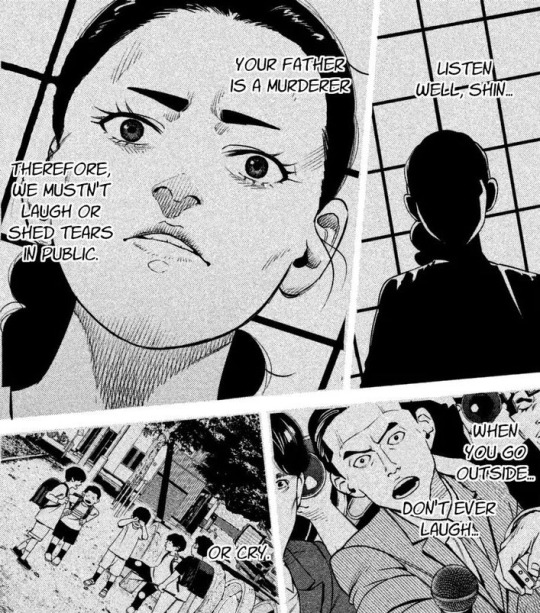
Back to Enji, Horikoshi gives us verbal confirmation that Enji is now being a father by being willing to do this, by having Natsuo, who never called him as such, calling him father for the first time.
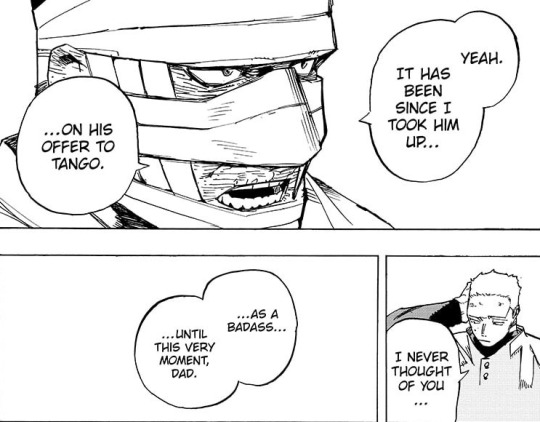
For Horikoshi that's Enji being a father.
Again, we've no idea of which hell Enji will suffer because that's not part of our culture. I've posted above screencaps of "Theseus no fune", that's how the fallout should be so not pretty at all.
So the fact that Enji will try to protect them from it is, again, BIG.
So yeah, Enji did do BIG things to atone and keeps on doing them and if he'll ultimately get forgiven by Natsuo (the rest of his family wanted to forgive him way before he were to do something), that's up to Natsuo... Horikoshi likely left this as open ending because he wanted to let it up to readers so as not to make them feel they were forced to forgive Enji.
In the general hopeful theme of the manga and with Natsuo acknowledging him as a cool father I guess his idea is that Natsuo too will eventually forgive him because he's kind.
I don't want to say that Natsuo forgiving Enji would be a culture clash because there's people even here that forgive their horrible parents and that's valid. Forgiving is a personal choice and one has the right to make it even if said horrible parent did nothing to deserve it.
It's up to you.
But sure is, if again we take the story at face value and not in its cultural contest, we can't see what Enji does to atone, because for us is nothing big.
It's even made worse by how Horikoshi doesn't show at all the hell Enji will go through (as for him is a given) so for us IT DOESN'T EXIST. We see Enji as having it easy, talking big but not having to face anything at all.
Honestly though... I think this is a bit of a flaw of the manga as a whole.
Way too often it prefers to focus on the good than on the bad so that the bad gets sidelined to much to the point people forget it.
There were horrible Heroes who committed crimes and had no intention to repent or stop... and we never met them. Nagant killed them off but we never met them.
Mountain Lady, who became a Hero for money and fame, then sticks to the job even when it's bad. Desugoro, who left the job when it turned bad, then came back to help. Enji is on an atonement path and, anyway, on work he was always a good Hero.
In the same way Horikoshi prefers not to show Enji's hardship but focus on how he'll have the support of his sidekicks, driver and Hawks... partly also because it ties in so well with the general message of everyone reaching out.
The result is that the Midoriya plotline of everyone reaching out becomes more important of the Enji atonement arc and overshadows it.
Enji's atonement arc ends in 426, chap 430 doesn't feel the need to tell us if Enji is keeping up with it despite the hardship, nor how his family is doing. It feels the need to reassure us that people will reach out for him even if he's in hell, that even if he had to give up on his family, he now as a new found family.
It's thematically consistent with the theme of reaching out but... the fact it overwrites the atonement arc honestly FOR ME doesn't work so great.
I think it's an overall problem of the 'reaching out message'.
While in itself is beautiful... it saves nothing I was lead to care about.
In Enji's case I was interested in his atonement arc, in how he could help his kids. I wanted more of that, partly because his atonement arc is so far from my culture, partly because it touched characters I cared about, I wanted to be reassured he would keep on working on it and that his family would be well.
Yes, he should be in hell, but the story didn't really work hard on trying to make me worry for him as it established already a support network for him. The story made me worry for the kids, for Touya, who was dying, for Fuyumi, who wanted back her family and won't have it, for Natsuo, who's marrying an unknown character so young, for Shouto, who has to cope with the loss of the brother with whom he wanted to connect.
I don't really care Burnin, Onima, Kido and Hawks are willing to continue to protect Enji, to reach out to help him, I knew they would, I wanted to be reassured Enji's kids are safe, well and protected. I wanted to see ENJI reach out and help them.
In this vein I don't really care the old grandmother saved a nameless abused kid, or, at least, not as much as I cared for Tomura to be saved. It's nice she saved him, it's nice he gets to live the life Tomura was denied but honestly, he's a mob character with a super tragic backstory created deliberately to force us to emotionally connect to him.
The message he now will be saved is good, but my emotional investment to him is too little.
The same applies to Uraraka's Quirk counsueling program, we knew next to nothing about the Quirk consueling previous program beyond that it didn't work (a real problem in Japan as they have a school consueling program that didn't work... and changes are in progress) and that now it supposedly does.
To how Shouji now solves peacefully plenty of conflicts caused by Heteromorph discrimination, which Horikoshi tossed in later and never really showed how to solve (and, don't take me wrong, it's not solved even by Shouji, he just solves peacefully the conflicts, how is up to everyone's speculation).
Long story short, I think Horikoshi worked really hard for BNHA to have an optimist, hopeful message... but part of it goes lost in cultural differences and part of it goes lost in how the story didn't try to get me invested in the things it's now saving.
So yeah, I'm still sad for this little panel in chap 430
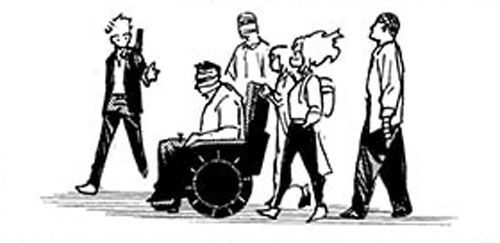
I guess I'll eventually get over it. Today though, it's not that day.
On a positive note... if we count the pages of all the chapters that should go in vol 42 they're only 132. The chapters that were meant to go into Vol 39 had 165 (which yes, Horikoshi further expanded once the volume was released).
So yeah, unless Vol 42 will be slimmer than usual or that he'll add to it some sidestory or extra story, it's possible we'll get more plot in terms of epilogue. We'll see.
(also yes, I'm not touching Rei in this post. Rei is another can of worm entirely and one, I fear, Horikoshi doesn't care about. The poor woman doesn't even get a profile while Ikoma Komari does. And really, I do think Rei is much more important than Ikoma Komari)
306 notes
·
View notes